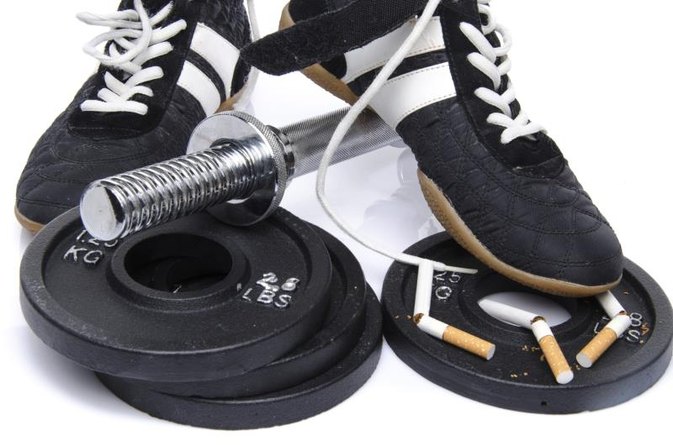Author
by
http://www.livestrong.com/article/482679-can-you-exercise-smoke/
by
If you belong to a gym, you might be surprised to see staff members and trainers puffing cigarettes. While this is not a common occurrence, many individuals in the diet and exercise industries develop habits that negatively impact their health. Smoking is a bad thing no matter how you cut it. It not only increases your risk of heart disease, respiratory disease and cancer, it also causes poor physical performance and minimizes endurance.
Effect of Cigarettes on Workouts
Smoking before, during or after a workout is a bit like having a huge meal immediately before doing 90 minutes of high-intensity cardio; the energy required to digest the meal will make your workout harder, reduce your stamina and probably make you feel sick. Smoking puts a strain on the heart and lungs by increasing the heart rate, which makes it less efficient at pumping blood to your muscles. Lung capacity is also diminished. According to Amanda Sandford, research manager at the U.K.-based Action and Smoking on Health, "The substances in the cigarette reduces your capacity to take in oxygen." This applies equally to both aerobic and weight-bearing exercises, although you will probably feel the effects more quickly during an aerobic session.
Myth of a Cancelling Effect
There is no cancelling out effect of exercise on smoking. A 1985 study from the "Journal of Applied Physiology" looked at the specific mechanisms cigarette smoking affected in the cardiorespiratory system in healthy men. It found that cigarette smoking decreased blood oxygen and increased pulse and heart rate, making it harder to catch that next breath. The slower your heart beats while working out, the better shape you are in. If you purposefully do anything to speed up the heart rate before exercise, you are setting yourself up for a less effective and fatigue-ridden session.
Smoking and Exercise
Carbon monoxide, a toxin in cigarettes, decreases blood oxygen levels. Smoking causes chronic swelling of mucus membranes, which also makes it harder to get that next breath during exercise. Sports physiologist David Payne cites a study which showed that 3,000 members of the U.S. Navy who smoked had lower physical endurance than nonsmokers. The same study showed that those who smoked were less inclined to participate in regular physical exercise. Most disturbingly, he cites another U.S. survey that found 15 percent of women who participate regularly in aerobics also smoke regularly, even though they know the detrimental effects on exercise.
The Good News
If you are trying to quit, vigorous exercise can help stave off cravings. Bess Marcus, author of the Commit to Quit program published by the "Archives of Internal Medicine," reports that smokers who are trying to quit and take up regular exercise are twice as likely to quit than those who do not participate in exercise. The problem is that the effect is short-lived, between several hours and one or two days. It's best to supplement an exercise program, if you are a smoker trying to quit, with nicotine replacement patches. This will help reduce cravings for longer periods of time.
http://www.livestrong.com/article/482679-can-you-exercise-smoke/







No comments:
Post a Comment